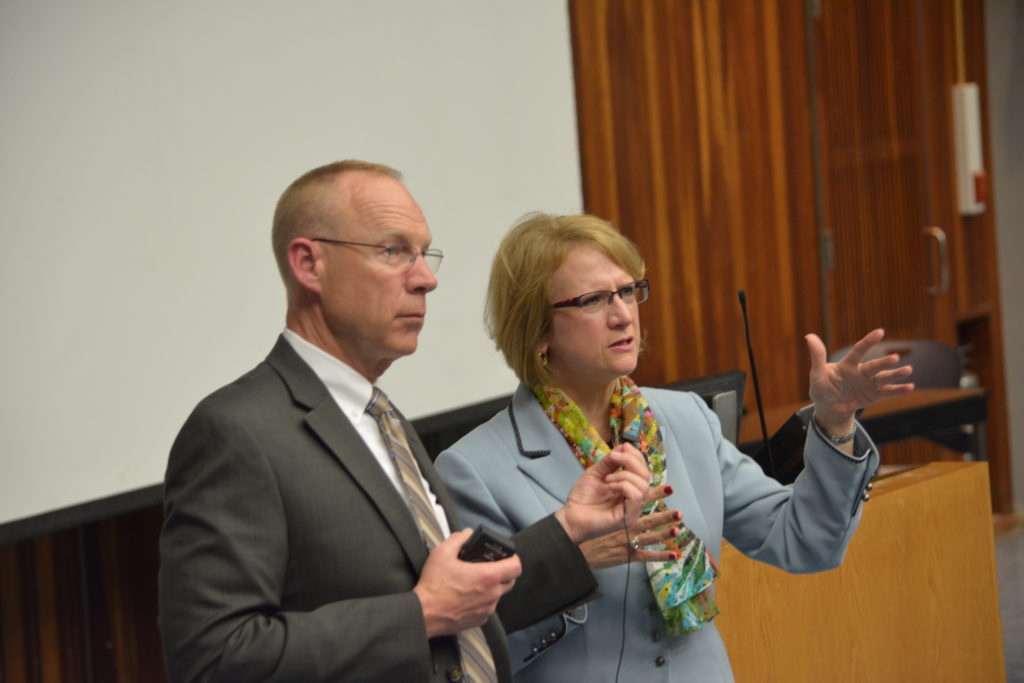The Public Safety Review Board’s meeting minutes thus far make one thing clear: transparency is not its priority.
The two documents offer only summaries of discussions, mostly without attributions, and detail how the board—formed last year for accountability in the wake of the decision to arm Public Safety officers—decided to keep most of its activities confidential, including full policies about use-of-force.
The minutes can be found two hyperlinks deep from University’s email on Monday that five senior officers have been armed on the River Campus and that 30 more will follow at the Medical Center by Feb. 6.
The Dec. 13 meeting minutes say that the Department of Public Safety (DPS) may provide an armed response on the River Campus when “there is a report of possession of a firearm or threatened use of any other weapon.”
No detail is provided on the standards by which a DPS officer should decide to fire their weapon in one of these scenarios.
This is the only DPS policy sketched in the minutes, which say that the department’s policies “will not be published in full to the University community or public.”
The lack of detail about the policy, though, appears in line with the board’s conclusions on transparency: the minutes note that the board agreed to keep its proceedings and discussions “largely confidential” and that it will decide what information to make public.
Michael Dorn, executive director of Safe Havens International, a nonprofit focusing on campus safety, told the Campus Times he doesn’t know why a full version of the department’s use-of-force policy wouldn’t be provided to the public.
“We would tell them to make that policy publicly available,” the veteran campus officer said.
When his group assesses campuses, he said, it’s one of the first things he wants to see.
The Review Board’s site says policies are not published for safety reasons.
Dorn—who was confused about the what the brief description of the policy actually meant—said that makes sense for tactical or strategic procedures, but not for guidelines on when and why an officer should use force.
The murkiness of the minutes applied not just to the use-of-force policy, but also to the charge University President Joel Seligman gave to the board.
According to the minutes of the board’s Nov. 18 meeting, Seligman “cited the recent spate of incidents involving robberies in the 19th Ward as evidence that the nature of the threat to the University community is changing,” as part of his opening objective-setting.
In October, however, Director of Public Safety Mark Fischer told the Campus Times that his department doesn’t intend to go into adjacent neighborhoods and that “any extra-campus jurisdiction it has effectively applies to ‘sidewalks and roadways.’”
He added at the time that Rochester Police Department “doesn’t want us policing their territory.”
University Spokesperson Sara Miller said the minutes were an accurate reflection of Seligman’s statement but that he was not and is not targeting the 19th Ward—one way the minutes’ account might be read.
“He was referring to the three then recent incidents (Oct. 17, Oct. 24 and Oct. 30) involving students in the 19th Ward and reemphasizing to the Public Safety Review Board that it is an institutional priority to take the appropriate actions that keep all students and employees safe,” she said in an email.
The five officers armed on campus earlier this month have completed the training outlined in the Security Commission Report, the University’s announcement said.
The report recommends a minimum 90 hours of firearms training and 28 hours of bias and diversity training.
The announcement also said that the 30 officers to be armed at the Medical Center have completed background checks and psychological evaluations and have undergone firearms training.
Seligman decided to arm officers after nearly a year of reviewing reports and hearing feedback. Students and faculty vocally opposed the move, with particular concern about arming officers amid a national debate about excessive use of force by police against minorities.



